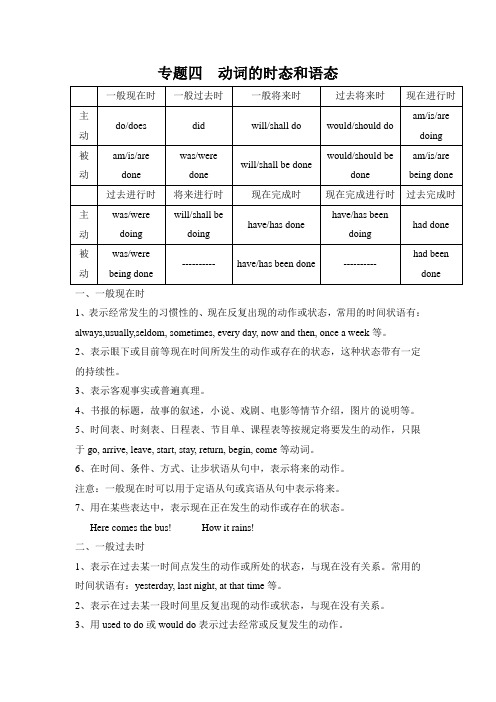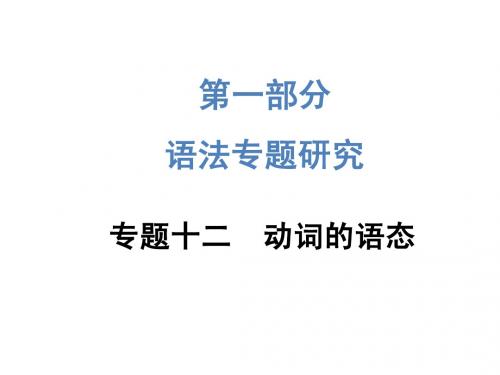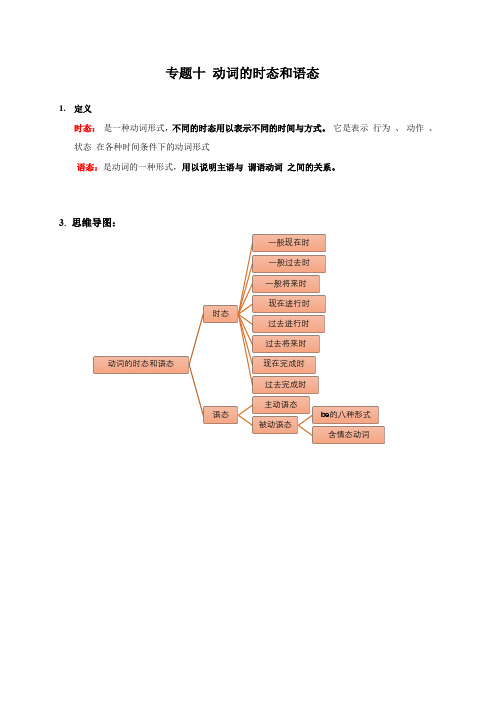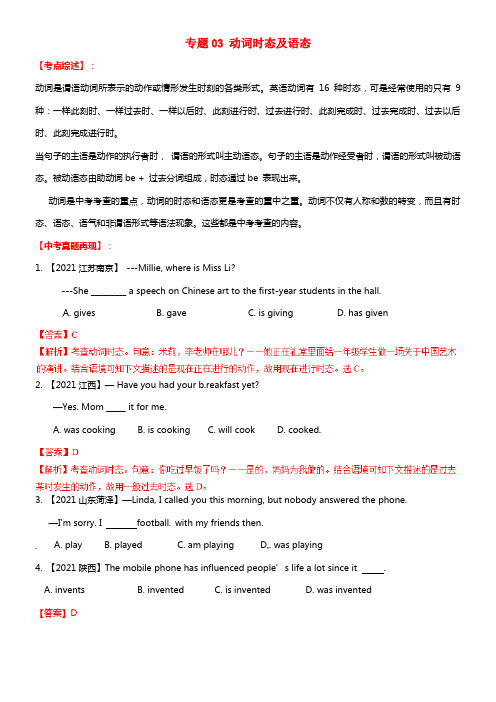2015年中考英语专题复习:动词时态及语态
【语法过关】专题12 动词的时态和语态中考英语一轮复习课件

满分秘籍
巧学妙记
提分特训
2.(2022·吉林长春·中考真题)There ________ a sign on the wall. It says you mustn’t smoke here.A.is B.are C.was D.were
【答案】A 【解析】句意:墙上有一个标志。上面说你不能在这里抽烟。考查 there be句型。主语“a sign”是单数形式,be动词用单数形式,且此句 陈述一般事实应用一般现在时,故选A。
满分秘籍
巧学妙记
提分特训
5.(2022·江苏淮安·中考真题)—I called you at 3 p.m. yesterday, but you
didn’t answer. —I ________ an experiment on Chemistry in the school
lab.A.was doing B.am doing
B.were taken place
C.have taken place
D.took place
【答案】C
【解析】句意:——据报道,在我们的家乡巴中,一条新的高速铁路将于近
几年建成。——是的。自从我在这里工作以来,这里发生了很大的变化。考
查动词时态。since+一般过去时的从句,主句用现在完成时,故选C。
时
has/have done
—What a clean office !办公室真干净! (1)表示过去发 —Yes, I am sure that someone has 生的动作对现 cleaned it.是啊,我确信一定有人已经打 在造成的影响 扫过了。 或结果。
时态的辨析
满分秘籍
易失分点
提分特训
2015年中考英语复习语法专题8 动词的时态、语态

动词过去式有规则变化和不规则变化两种情况,不规则变化应特别
记忆。规则变化有如下形式: ①一般在动词后直接加ed。如:climbed,w
考点知识精讲
②以e结尾的动词在后面直接加d。如:lived,described, agreed等。
首页
③以辅音字母+y结尾的,先把y变为i再加ed。如:cry—cried, copy—copied,try—tried等。以元音字母+y结尾的,直接加ed。如 enjoy—enjoyed,play—played等。
如果明天不下雨,去爬山怎么样?
2.一般过去时
上一页
下一页
考点知识精讲
的动作、行为。
首页
(1)概念:表示过去发生的动作,存在的状态或过去习惯性、经常性
(2)构成形式:
①肯定式:be(was,were);行为动词(过去式) ②否定式:was/were+not;行为动词didn't+动词原形 ③疑问式:was/were+主语+其他;行为动词did+主语+动词原形 (3)动词过去式的变化:
构成形式:am/is/are或实义动词的原形(主语是第三人称单数时, 动词要用第三人称单数形式)。
上一页
下一页
考点知识精讲
与一般现在时连用的时间状语有:always,often,usually, sometimes,once a week,every day等。
首页
动词第三人称单数形式的构成:
①一般动词在词尾直接加s,如lives,works等。 ②以s,x,sh,ch,o结尾的,加es,如goes,does, washes, passes等。 ③以辅音字母+y结尾的,把y变为i,再加es,如fly—flies, study—studies,worry—worries;以元音字母+y结尾的,直接加s, 如enjoy—enjoys,play—plays。 ④特殊情况:have—has,am/are—is
2015高考英语高频考点专题四:动词的时态和语态

专题四动词的时态和语态一、一般现在时1、表示经常发生的习惯性的、现在反复出现的动作或状态,常用的时间状语有:always,usually,seldom, sometimes, every day, now and then, once a week等。
2、表示眼下或目前等现在时间所发生的动作或存在的状态,这种状态带有一定的持续性。
3、表示客观事实或普遍真理。
4、书报的标题,故事的叙述,小说、戏剧、电影等情节介绍,图片的说明等。
5、时间表、时刻表、日程表、节目单、课程表等按规定将要发生的动作,只限于go, arrive, leave, start, stay, return, begin, come等动词。
6、在时间、条件、方式、让步状语从句中,表示将来的动作。
注意:一般现在时可以用于定语从句或宾语从句中表示将来。
7、用在某些表达中,表示现在正在发生的动作或存在的状态。
Here comes the bus! How it rains!二、一般过去时1、表示在过去某一时间点发生的动作或所处的状态,与现在没有关系。
常用的时间状语有:yesterday, last night, at that time等。
2、表示在过去某一段时间里反复出现的动作或状态,与现在没有关系。
3、用used to do或would do表示过去经常或反复发生的动作。
4、有些情况发生的时间没清楚表明,但实际上是“刚才,刚刚”发生的,属于过去时间,应使用过去时态。
常见的有I didn’t know…或I forgot…等。
5、一般过去时可与today, this week, this month等时间状语连用。
三、一般将来时1、will/shall do(1)表示将来会出现的动作或状态。
常用的时间状语:this evening, tomorrow, next week/month…,at the end of this term, in a few minutes等。
2015中考英语—第一部分 语法专题研究:专题十二 动词的语态

(3)表示“发生”的happen或take place,无被
动结构。如:
The story happened on a cold night. (√) The story was happened on a cold night.(×) 故 事发生在一个寒冷的夜晚。
3. 主动语态变被动语态的方法 (1)转换图示: 主动语态变被动语态的方法: 转换图示:
C. can be kept
B. keeps
D. kept
【 解析 】考查情态动词的被动语态。 句意:不要担心,你的包 _____ 这儿直 到你回来,请愉快地购物。will keep一 般将来时; keeps一般现在时; can be kept情态动词的被动语态;kept一般过 去时。此处应该是包被保存,应使用 被动语态,故选C。
一般现在 be(am/is/are) 时(考查 +动词的过去 3次) 分词 一般过去 be(was/were) 时(考查 +动词的过去 1次) 分词
时态
被动结构
例句
一般将来 will/shall+be+ The bridge will be 时(考查 动词的过去分 finished in a month. 这 2次) 词 座桥将在一个月内竣工。 情态动词 情态动词 (考查3 +be+过去分 次) 词 Such work can be done n in an hour or so.这项 工作可以一个小时左右 做完。
2. —A talk on American culture ____ in the school hall yesterday afternoon. —It’s a pity. I missed it. A. gave C. has given B. was given D. is given
初中英语人教版 中考 语法专题 10 动词的时态和语态

专题十动词的时态和语态1.定义时态:是一种动词形式,不同的时态用以表示不同的时间与方式。
它是表示行为、动作、状态在各种时间条件下的动词形式语态:是动词的一种形式,用以说明主语与谓语动词之间的关系。
3. 思维导图:动词的时态和语态时态一般现在时一般过去时一般将来时现在进行时过去进行时过去将来时现在完成时过去完成时语态主动语态被动语态be 的八种形式含情态动词1.动词的时态1.常考的时态构成及用法a.一般现在时d.现在进行时e.过去进行时f.过去将来时g.现在完成时h.过去完成时2. 动词的语态a. 分类:主动语态:表示主语是动作的执行者被动语态:表示并语是动作的执行者c.主动语态和被动语态的转换规则典型例题总分:50分姓名:得分:1.单选题(每小题1分,共50分)( ) 1. Jenny, together with the Greens the White Tower Park if it tomorrow.A.are going to; isn't rainyB.is going to; doesn't rainC.are going to; won't rainD.is going to; isn't rain( ) 2. The old man for quite some time.A.has diedB.dieC.has deadD.has been dead( ) 3. It is reported that a tall building in the city next year.A.will be builtB.were buildC.have builtD.will build( ) 4. My sister for 2 years.A.has marriedB.have got marriedC.has been marriedD.married( ) 5. Chinese ________in many schools around the world and many people love to learn it.A.teachesB.is teachingC.has taughtD.is taught( ) 6. When Tom was in primary school, he ________the piano every day.A.playsB.playedC.was playingD.has played( ) 7. A baby's first month birthday is a special event in China and _____with a special Party.A.celebratesB.is celebratedC.was celebratedD.will celebrate( ) 8. -Were you at home at 9 o'clock last night?-Yes, I a shower at that time.A.tookB.was takingC.was takenD.am taking( ) 9. National Day celebrations for China's seventieth birthday in about three months.A.will be heldB.will holdC.is heldD.was held( ) 10. We don't know if he tomorrow. If he, I will call youA.will come, will comeB.will come, comeses, will comees, comes( ) 11. He told me that he ______ his uncle in Thailand the next day.A.will visitB.has visitedC.is going to visitD.would visit( ) 12. -Tom, do you know ________? -In Beijing.A.where will the 24th Winter Olympics be heldB.where the 24th Winter Olympics will holdC.where the 24th Winter Olympics will be heldD.where will the 24th Winter Olympics hold( ) 13. Peter with his classmates ________ for the bus when the earthquake happened.A.is waitingB.was waitingC.are waitingD.were waiting( ) 14. his museum ________ here for over 80 years. It ________ one of the oldest buildings in this city.A.is; wasB.had been; isC.was; has beenD.has been; is( ) 15. -Mrs. Brown, how long can books from the school library ?-At most two weeks.A.borrowB.keepC.be borrowedD.be kept( ) 16.-An AI robot _____in our school dining hall next term.-I'm looking forward to it.A.will useB.will be usedC.is usedD.was used( ) 17. Usually a baby's face ____ smooth.A.is feelingB.feltC.feels likeD.feels( ) 18. She _____ an English magazine when I came in.A.readsB.has readC.will readD.was reading( ) 19. I will call you as soon as he______ here.A.arriveB.will arriveC.arrivesD.arrived( ) 20. Boys and girl, ______ learning and have fun!A.keepB.to keepC.keepingD.kept( ) 21. There ______a basketball game between these two grades in the gym this afternoon.A.willB.is going to haveC.is going to beD.will have( ) 22. We ______TV from seven to nine last night.A.were watchingB.will watchC.watchedD.watch( ) 23. Jack's mother taught me how ________ Yunnan rice noodles last weekend.A.to makeB.makingC.makeD.to making( ) 24. Mrs. Green said the plates ________ right away,or they would become difficult to wash.A.will be washedB.should washC.will washD.should be washed( ) 25. The documentary Under the Dome (《苍穹之下》)which ________ by Chai Jing showed us that the air pollution in China was very serious.A.producesB.producedC.is producedD.was produced( ) 26. -What did you do last night?- I ________ my homework and watched TV.A.didB.doC.am doingD.will do( ) 27.The hospital is very famous. It _______ in 2001.A.buildsB.builtC.was builtD.is built( ) 28.These rules are made the disabled.A.protectB.protectedC.to protectD.protecting( ) 29. -How much does the TV ?-Not too much. It's just a second-handed one.A.costB.spendC.takeD.pay for( ) 30. -Have you ever ________ an amusement park?- Yes, I have ________ Fun Times Amusement Park last year.A.been to, have gone toB.gone to, have been toC.go to, went toD.been to, went to( ) 31.We are glad to hear that the terrorists ________ by the brave policemen several days ago.A.are caughtB.were caughtC.have been caughtD.are going to be caught ( ) 32. -Why didn't you go to the party last night? - Because I _____.A.wasn't invitedB.didn't invitedC.haven't invitedD.don't invited ( ) 33. -What _____ you supposed ____ when you are in China?- You should shake hands.A.are, to doB.do, to doC.are, doingD.have, to do( ) 34. So far, we ________ English for three years.A.have learntB.learnC.learntD.had learnt( ) 35.The boy was made ______ the words again and again.A.copyB.copyingC.copiesD.to copy( ) 36. The sports meeting in our school now.A.being heldB.is havingC.is holdingD.is being held( ) 37. The window ____ ten minutes ago, and the room is bright now.A.can be cleanedB.is cleanedC.was cleanedD.will be cleaned( ) 38. -Oh, Mrs. King, your necklace looks nice. Is it new?-No, I _______ it for 2 years.A.hadB.have hadC.boughtD.have bought( ) 39. He has ordered a watch on line for his father and it _______ to him before Father's Day.A.sendB.will be sentC.was sentD.sent( ) 40. There ______ a funny cartoon on CCTV 6 this evening.A.willB.will haveC.is going to beD.is going to have( ) 41. -________ did your uncle leave his home town? -He ___________ for nearly twenty years.A.When, has leftB.When, has been awayC.How long, has leftD.How long, has been away ( ) 42. My uncle ________ Germany on business many times.A.has been onB.has gone toC.has been toD.has been in( ) 43. Her life ________ a lot during the last three years.A.changedB.changingC.has changedD.will change( ) 44. -Lisa was seen ______ an old man go across the street this morning. -What a kind girl she is!A.helpingB.helpedC.to helpD.helps( ) 45. My computer has broken down. I'll get it _______ this afternoon.A.repairsB.repairedC.to repairD.repairing。
【火线100天】2015中考英语 基础语法九 动词的时态和语态

过去进
行时
was/were+动词的现在分词
表示过去某个时刻或某段时间正在进行的动作。
现在完
成时
have/has+动词的过去分词
1.表示过去发生的动作对现在造成的影响和结果。
2.表示动作从过去开始一直持续到现在,并有可能继续下去,常与“for+时间段”或“since+表示过去的时间点或时间段”连用。
——I’m sorry.I’ll do it right now.
A.sleep B.slept
C.is sleeping D.are sleeping
一般将来时与过去将来时
( )11.(2014·河北)I’m busy now. I ______ to you after school this afternoon.
C.will clean D.clean
( )8.(2014·河北)Someone _____ at the door.Can you open it?
A.knocks B.knocked
C.is knocking D.was knocking
( )9.(2014·孝感)—I was at the cinema at 8 o’clock last night.What about you?
—No,because I ________ the story.
A.read B.will read
C.have read D.was reading
( )17.(2014·滨州)—Jim isn’t in the classroom.Where is he now?
中考英语备考 专题03 动词时态及语态(含解析)

专题03 动词时态及语态【考点综述】:动词是谓语动词所表示的动作或情形发生时刻的各类形式。
英语动词有16种时态,可是经常使用的只有9种:一样此刻时、一样过去时、一样以后时、此刻进行时、过去进行时、此刻完成时、过去完成时、过去以后时、此刻完成进行时。
当句子的主语是动作的执行者时,谓语的形式叫主动语态。
句子的主语是动作经受者时,谓语的形式叫被动语态。
被动语态由助动词be + 过去分词组成,时态通过be 表现出来。
动词是中考考查的重点,动词的时态和语态更是考查的重中之重。
动词不仅有人称和数的转变,而且有时态、语态、语气和非谓语形式等语法现象。
这些都是中考考查的内容。
【中考真题再现】:1. 【2021江苏南京】---Millie, where is Miss Li?---She _________ a speech on Chinese art to the first-year students in the hall.A. givesB. gaveC. is givingD. has given2. 【2021江西】— Have you had your b reakfast yet?—Yes. Mom _____ it for me.A. was cookingB. is cookingC. will cookD. cooked3. 【2021山东菏泽】—Linda, I called you this morning, but nobody answered the phone.—I'm sorry. I football with my friends then.A. playB. playedC. am playingD. was playing4. 【2021陕西】The mobile phone has influenced people’s life a lot since it .A. inventsB. inventedC. is inventedD. was invented【答案】D【解析】考查动词时态及语态。
中考英语专项复习-动词语态

时态体现在谓语,时间轴要在脑中划; 现在、过去与将来,各自对应有结构; 语态就是主变被,助动be带分词done; 所有时态变被动,时态助动仍保留, 谓语动词变为done,中间语助be起变化; 现在时与过去时,be与done组被动,其余 时态判断重语境,特殊构成要记牢。
时态三部分;
四、被动语态中的特殊情况
1. 这些动词真奇怪,主动句中to 离开,被动句中to回 来。( let ,have ,make,feel, see ,watch, hear,notice…)
e.g. They make us do all the work. 被动句:We are made to do all the work by them.
被动语态特殊情况记忆口诀:
被动语态强调“宾”,用be加上“过去分”。 “be”要随着主语变,人称时态要弄准。 “行为对象”作主语,逻辑主语“by”来引。 原句若是双宾语,一变“主”来一保“宾”。 “间宾”要把主语变,原来“直宾”还是“宾”。 “直宾”要把主语变,“间宾”前加“to”最称心。 唯有原“宾”是“复合”,只有变宾要当心。 原句“宾补”变“主补”,位置不必挪寸分。 情态动词变“被动”,情态加be加过分。 如若“情态”后带to,变后有to才弄准。 “短语动词”变“被动”,相当“及物”莫疑心。 不过其后“介”或“副”,变后还得要承认。
have/has+been done
过去完成时 had+done
had+bene done
三、主动语态变被动语态的方法
(主语)
(宾语)
主动语态:动作的执行者+谓语动词的主动形式+动作的承受者
三.主动语态变被动语态的方法
说明:
被动语态:动作的承受者+谓语动词的被动形式+动作的执行者
- 1、下载文档前请自行甄别文档内容的完整性,平台不提供额外的编辑、内容补充、找答案等附加服务。
- 2、"仅部分预览"的文档,不可在线预览部分如存在完整性等问题,可反馈申请退款(可完整预览的文档不适用该条件!)。
- 3、如文档侵犯您的权益,请联系客服反馈,我们会尽快为您处理(人工客服工作时间:9:00-18:30)。
中考专项复习——动词时态及语态考点精讲考点1 一般现在时有哪些特殊用法?(1)表示此时此刻正在发生的动作或存在的状态。
What’s the time now? 现在几点了?(2)在含时间和条件状语从句的复合句中(主句为一般将来时)。
I’ll call you as soon as I arrive in Beijing tomorrow.明天一到北京,我就给你打电话。
(3)在主句为过去时态的复合句中,如果宾语从句陈述的是客观真理,从句用一般现在时。
The teacher said Maria is a girl.老师说玛利亚是个女孩。
(4)表示书、信、报纸、通知、广播、告示牌等的内容用一般现在时。
It says, “Closed”.上面写着,“停止营业”。
专练用所给动词的适当形式填空1、T hree plus two_________(be)five.2、There____________(go)the bell!3、Light______________(travel)faster than sound.4、If you____________(ask)her tomorrow, she will help you.5、The notice _______________(say)“No Smoking!”.考点2 如何使用used to?used to后加动词原形表示“过去常常”,其疑问句和否定句可直接使用used,也可借助于did。
I used to be afraid of dark .我过去常怕黑。
He usedn’t to ride to school.他过去不常骑车去上学。
He used to smoke, didn’t he?他过去常抽烟,是吗?注意:be used to doing 意为“习惯做某事”,be used to do 意为“被用来……”,不要混淆。
专练按要求变化下面的句型1、She used to play near the river.(改为否定句)__________________________________________________________________________2、T he children didn’t use to come here early,_____________________?(补全反意疑问句)考点3 一般将来时有哪些形式?(1)“be going to+动词原形”表示计划或打算在最近要做的事。
I’m going to take you to the park.我打算带你去公园。
(2)“will/shall+动词原形”是单纯的将来时,常与表示将来的时间状语连用。
He will come back next week.他下周回来。
(3)“be+动词不定式”结构,表示按计划要发生的事,或用来征求对方意见。
We are to meet outside the park. 我们约定在公园外面见。
Am I to go on with the work? 这工作我是不是接着干下去?(4)“be about+动词不定式”结构,表示即将做某事,一般不用时间状语。
It is about to rain.天要下雨了。
(5)现在进行时可用于表示马上要发生的动作,多用于瞬间动词(start,begin,die等)。
I’m leaving for Shanghai. 我要去上海了。
专练按要求变化下面的句型1、Have you finished your homework? Not yet. I__________________________________(this afternoon).2、Where are you going this Sunday? _______________________________(the zoo).考点4 哪些动词没有进行时?表示感觉、情感、状态、看法、意愿的动词一般没有进行时,这类动词有:hear, see, smell, look, seem, think, like, want, hope, belong, cost, weigh, prefer, remain, have, own, believe等。
专练改正下面每个句子中的错误1、I’m hearing a strange noise now.2、Now you are looking beautiful.考点5 现在完成时和一般过去时有什么区别?二者表示的动作都在过去发生。
现在完成时强调过去的动作对现在的影响和结果,不能与表示过去的时间状语连用;一般过去时只表示过去的事实,与现在没有关系。
—Have you done your homework?你做作业了吗?—Yes, I have.做了。
—When did you do it?什么时候做的?—Last night.昨天晚上。
专练根据所给的动词短语,分别用一般过去时和现在完成时造句1、go to the beach2、not hear of that考点6 have been to, have been in和have gone to有何区别?have been in 表示“在某地……”;have been to 表示“去过”某地,常与ever, never ,…before, once ,twice 等连用;have gone to 表示“去了”某地,人可能在途中或已到达那里。
专练用have(has) gone to, have (has)been to, have(has) been in 填空1、Tim____________________________out. He’ll be back in an hour.2、Jim___________________________this city for two years.3、 ___________you ever______________Jinan? It has some famous springs.考点7 现在完成时的句子,谓语何时用瞬间动词,何时用延续动词?若表示持续性的动作,常与表示一段时间的状语如these days, in the past few years, during the last three months, for two years, so far, up to now, till now, recently 等连用。
The old man has been away from home for twenty years.那老人离开家已十年了。
注意:瞬间动词不能与持续性的完成时连用,必须改为延续动词,记住下面的瞬间动词与延续动词的换用:I came to this school ten years ago. = I have been in this school for ten years. = Ten years haspassed since I came to this school. = It is ten years since I came to this school.专练 A )用所给动词的适当形式填空1、I __________________(buy )this bicycle for five years.2、You can ________________(borrow )it for two days.3、The film________________(begin )for five minutes.4、How long ______________ you _________________(go )this school?5、My brother ______________ (join) the army since 1999.6、I _________________(put on )the shoes since three years ago.7、The old man___________________(die )since 2000.B ) 将下面的句子变为同义句8、 They got married two years ago. It _______________________since they got married.9、We came to this school three years ago.We__________________________ this school __________three years.10、I have been up for two hours. Two hours __________________________I got up.考点8 如何将主动语态变为被动语态?主动句变为被动句的方法是:一看动词,二换主语,三变谓语。
(1) 主动句有双宾语,可将其中一个宾语变为主语,但若将直接宾语用作主语,后面要使用to 或for 引出间接宾语。
He gave me a book yesterday.→I was given a book yesterday./A book was given to me yesterday.( 2 ) 动词短语是一个不可分的整体,变化时不能丢掉介词或副词。
You should speak to me politely. →I should be spoken to politely.(to 不可少)(2) 主动句的主语若是地点名词,变化时不要忘记加介词。
Shandong produces salt. →Salt is produced in Shandong.( 4 ) 带宾语补足语的动词变为被动语态时,宾补在原位置不动。
I saw a man playing basketball there. →A man was seen playing basketball there.( 5 ) 在主动句中某些动词后的不定式可省略to ,但在被动句中to 要补出。
Our parents make us study hard. →We are made to study hard.专练 将下面句子的主动语态变为被动语态,被动语态变为主动语态1、 The students clean the room every day.2、 She gave me twenty yuan last week.3、 A present was bought for me by my sister.4、The girl has taken care of the blind men for five years.考点9 哪些动词的主动形式可以表示被动意义?(1)系动词,如look, feel, taste, smell等。
